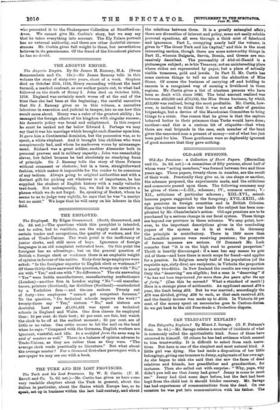THE EMPLOYED.
The Employed. By Edgar Greenwood. (Scott, Greenwood, and Co. 3d. net.)—The questions which this pamphlet is intended, not to solve, but to ventilate, are the supply and demand in certain trades and occupations, the quality of workers, and the action of Trade-Unions. The weak point is the inefficiency of junior clerks, and still more of boys. Ignorance of foreign languages is an old complaint reiterated here. On this point the foreigner has an advantage ; but on the general question of British v. foreign clerk or workman there is an emphatic weight of opinion in favour of the native. Sixty-four large employers were asked: "Is the foreigner superior to English clerk or workman 1" Of these thirty-three answered the question, twenty-six with "No," six with " Yes," and one with " No difference." The six answering "Yes" were bottle manufacturers, manufacturing confectioners (London)—another firm in London saying " No "—oil manufac- turers, printers (Scotland), tar distillers (Scotland)—contradicted by a Yorkshire firm — and tin-can makers. Twenty out of forty - two employers " cannot get competent foremen." To the question, " Do technical schools improve the work ? " twenty-three say " Yes," sixteen " No," and sixteen are doubtful. Last year £1,051,422 was spent on technical schools in England and Wales. One firm classes its employed thus : 10 per cent. do their best ; 40 per cent. are fair, but watch the clock to be off at the earliest moment ; 50 per cent. are of little or no value. One critic seems to hit the nail on the head when he says: "Compared with the Germans, English workers are ignorant, wasteful, and idle. In a modified form the same may be said of masters as well There is a balance of opinion adverse to Trade-Unions, as they are rather than as they were. "The average clerk reads practically no literature." But what about the average master ? For a thousand first-class passengers with a newspaper we may see one with a book.






















































 Previous page
Previous page